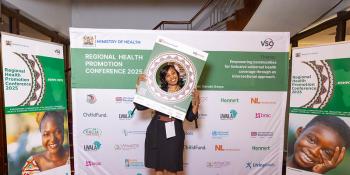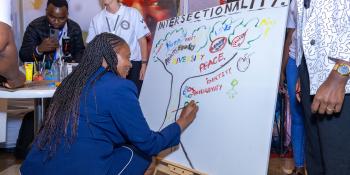Watch what happened when we brought two British VSO volunteers together who volunteered in Ghana to find out how different their experiences were – 60 years apart.
In the summer of 1958, 18-year-old Chris Tipple was about to leave for a trip to Ghana that would go on to define his personal and professional life.
Chris had spotted an advert in his local paper for a VSO role in newly-independent Ghana – and months later found himself on a plane to begin a year as a volunteer teacher. Later completing a distinguished career in education, Chris never lost his belief in the power of young people.
Almost 60 years later, in October 2017, 18-year-old Jack Algeo made the same journey to Ghana on VSO’s youth volunteering programme, ICS. On Jack’s placement, he gave classes and ran after-school clubs focused on improving girls’ academic achievements. He’s now looking ahead to a future of volunteering.
Chris’ story
In 1958, the idea of a school-leaver working overseas was very strange. My own parents never went abroad in their entire lives. They weren’t unusual in that respect. I’d never been outside the country before I stepped on the plane to fly to Accra.
I found myself teaching in a town called Akropong, which was about 40 miles north of Accra, the capital of Ghana.
It may sound very challenging to go out into another country and start teaching English, having never done it before. But it all really fell into place very easily, because the students were so keen.
It’s so important for young people to have a connection with a different part of the world to understand how other people live and how life is outside the UK.Chris TippleVSO volunteer, Ghana, 1958
At the time, education was thought of as the passport to a better life for everybody in Ghana, and it was presented in the form of Shakespeare and the English culture. Sadly there was no African dimension to what was taught in the curriculum. I hope that’s changed since.
When I returned to the UK after my year in Ghana, I went on to work in education for the rest of my career. I eventually became Director of Education for Northumberland County Council in 1983, a position I held for 16 years. One thing that really influenced me to work in a service industry like education was my time volunteering with VSO.
Later in my career I was in a position to try and enable other young people to have the sort of experience I was fortunate to have at 18, by setting up links between schools in my county and those in Tanzania.
When I went back to Ghana in 1998 and met students I taught 40 years before, they reinforced that VSO had really made a difference to their lives. They found not only practical advantages in terms of getting better grades in their exams, but also from the experiencing of interacting with someone from a different culture as equals.
I've supported VSO continuously since I came back from Ghana all those years ago and it’s great to see that in 2018 it embraces such a wide range of volunteers – from experienced professionals to school-leavers like I was. That width of experience is great.
Young people are the future. They will ultimately shape the way the world progresses. I think VSO’s contribution to youth means that hopefully over time the world will become a place in which people understand each other better.
Jack’s story
The year I went on ICS was the first time I travelled to Africa. The furthest I'd been from home was northern France, so it was amazing to be volunteering in Jirapa in northern Ghana, a place that was so different from my village of Longniddry, east of Edinburgh.
While grades matter, it also matters that children enjoy education. If they enjoy it, they’ll stay in it for longer. When we were teaching, we made it enjoyable and engaging – we tried to break away from traditional teaching methods of textbooks and chalkboards.
A lot of the school clubs that we led while we were in Ghana had been previously started by other VSO volunteers and carried on by the teachers. It was nice to see that when we left, the clubs that we’d started, and those we’d continued, weren’t just going to stop.
While on placement, each British volunteer had a Ghanaian counterpart to help us adjust to the culture and to work alongside. I’d heard from previous volunteers that they become your best friend, but I always presumed it was just what they said. But it’s so true. You form a bond because you spend every day with them.
Better education equals greater potential. By discounting women, we’re discounting potential.Jack AlgeoVSO volunteer, Ghana, 2018
Women make up 50% of this planet we share, but in a lot of cultures – and in some of the situations we saw in Ghana – they aren’t pushed to their full potential.
While volunteering with the female students, we helped show them that equal opportunities are available, careers they can take and pathways they can follow.
Now I’m back I definitely want to follow this on with more volunteering. ICS has had a huge impact on what I want to do in the future. For now, I’m off to university to study history and politics, but after that I’m just going to see where volunteering takes me.
Read more

The two volunteers empowering girls and young women in Mozambique
Nelma and Carmirene and are two volunteers working on VSO's EAGLE project in Mozambique. For Nelma and Carmirene, education is not just about school, it is about meeting people where they are and using the right tools to challenging harmful norms. Here are their stories.

In photos: Our Regional Health Promotion Conference 2025
Check out some of our favourite photos from Regional Health Promotion Conference (RHPC25). This event sought to reimagine Universal Health Coverage through the lens of intersectionality.

Using intersectionality to create healthy beginnings and hopeful futures
World Health Day brings global attention to the urgent need to end preventable maternal and newborn deaths. Learn more about how our Regional Health Promotion Conference is tackling these issues head on.
